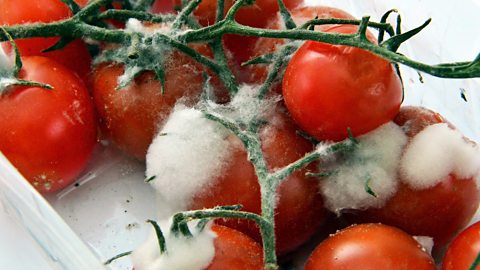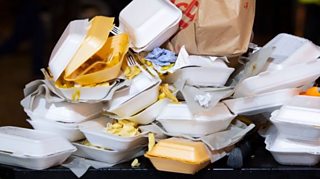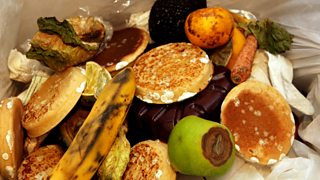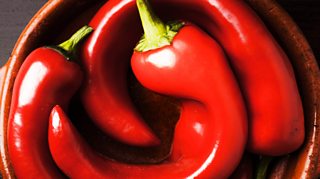How to tackle climate change from your kitchen
Confronting our attitudes to food waste could help the environment and save us money.
Whether it's out of date sausages, mouldy tomatoes, or uneaten pasta, we throw away an enormous amount of food. According to Zero Waste Scotland (ZWS) each day we get rid of two million slices of bread, half a million potatoes and 87,000 eggs.
This not only costs us money and wastes resources, but if the discarded food ends up in landfill it rots away and produces methane, one of the most potent greenhouse gases. However, as Clever about Cash revealed, if we follow some simple guidelines we can avoid waste, helping both our wallets and the planet.

Use by or best before?
Ylva Hagland explains what dates on food packaging actually mean.
Ylva Hagland from ZWS explained that we can make a big difference by following four rules: plan meals, check dates, watch portion sizes and and store items correctly.
Meal planning
We don’t plan our meals enough, says Ylva. She advises that before we head to the supermarket we should check what's already in the cupboard and think about what we're going to eat over the next few days. This should avoid us being tempted to buy items on offer, as well as saving us money.
"That is one of the main reasons we waste food; we simply buy things we’re not going to use," she says.
Using up in-date items
Don't allow items in your fridge to pass their use-by date, suggests Ylva. "If you see meat or fish or anything else with a use-by label that’s coming soon transfer it from your fridge to your freezer and then you can use it another time. You have immediately saved yourself money there as well," she says.
Portion control
Has anybody ever managed to cook the correct quantity of rice, pasta or potatoes? Ylva acknowledges that measuring the right amount of these items can be tricky, but she recommends that a mug of dried rice will be enough to feed four adults. More information about portion size can be found here.
"It’s [about] getting to know how much you need," says Ylva. "In the long run that could be a massive money saver because you’re not constantly over-cooking. When we do that we throw the same thing in the bin week after week."
Storage
Ylva's final advice is to store fresh ingredients properly to help them last longer.
"Most fruit will last up to 2/3 weeks longer in the fridge," she explains. "Of course it’s tempting to put it out in a nice fruit bowl but my tip would be take out what you think your family might eat for the next few days and put that in the bowl. Put the rest in the fridge and it will last much longer, rather than putting it in the bin."
On ÃÛÑ¿´«Ã½ Sounds: Clever about Cash reveals how changes to our daily lives can save us money and help the environment.
More on food waste
Latest features from ÃÛÑ¿´«Ã½ Scotland
-
![]()
'Wild swimming helps me process the grief of losing my son'
The benefits of cold water therapy.
-
![]()
Winter adventures are appealing, but an expert advises caution
Trips in winter require particular knowledge and skills.
-
![]()
The rescuers: Why volunteers risk their lives in mountain emergencies
Landward meets members of the Cairngorm Mountain Rescue Team.
-
![]()
‘Look for the light’ – practical tips to help you through another winter with SAD
Useful advice and tips to combat low moods at this time of year.
-
![]()
How you could be a binge drinker without even knowing
Binge drinking is classed as fewer units than many people may realise.
-
![]()
How chocolate biscuits and drama classes helped one man leave prison behind
The healing power of creativity.
-
![]()
'When people believe in you, it’s life-changing'
Author Graeme Armstrong revisits the man who helped turn his life around.
-
![]()
The 'breath-taking' display of US birds swept on to British soil
Recent storms have brought rare birds to our shores.
-
![]()
Six things we learned about Alan Cumming on Take the Floor (Spoiler: includes accordions)
The actor spoke to Take the Floor's Gary Innes.
-
![]()
How street gangs trap young men in a dangerous cycle of violence
The almost inescapable pull of life in a gang.
-
![]()
Why stylist Gok Wan believes there's no such thing as bad fashion
The fashion expert says we should stop following rules and do what feels right.
-
![]()
Is sending a CV still the right way to apply for a job?
They've been central to job applications for years, but are they worth it?



















